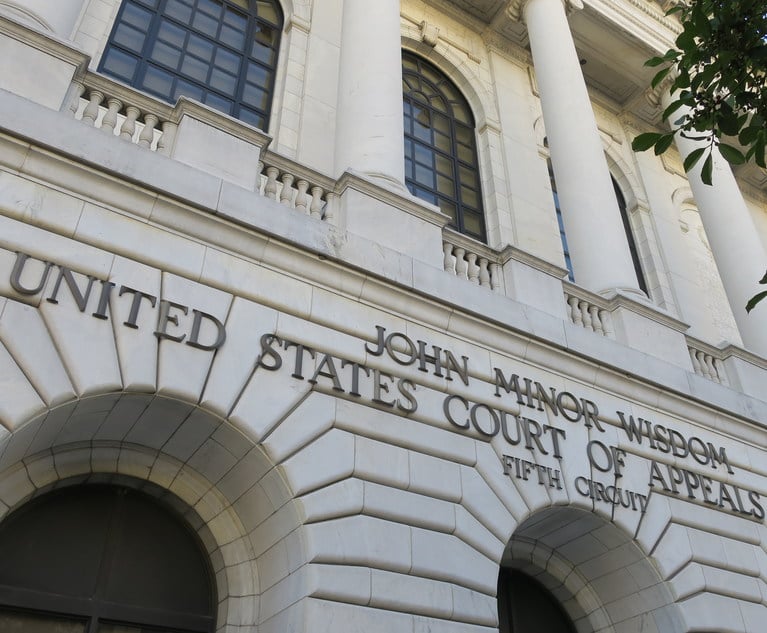Court Grants New Chance for Suit Linking Lawn Fertilizer, Mesothelioma
A New Jersey appeals court has reopened a wrongful death suit on behalf of a man who, plaintiffs claim, developed mesothelioma as a result of using Scotts lawn fertilizer.
February 26, 2018 at 05:29 PM
4 minute read

A New Jersey appeals court has reopened a wrongful death suit on behalf of a man who, plaintiffs claim, developed mesothelioma as a result of using Scotts lawn fertilizer.
The appeals court, reversing the trial judge, said newly discovered evidence required reopening the case. Scotts had secured dismissal of the lawsuit on summary judgment in January 2014.
Another suit seeking to link Scotts lawn fertilizer to mesothelioma, Fraser v. Scotts, also ended in a defense verdict in a state court in Los Angeles in July 2017, according to online reports. The jury verdict in that case is on appeal.
The New Jersey suit was brought on behalf of Lorenz Brandecker, a cabinet maker from Wayne, New Jersey. His July 2012 suit claimed that his twice-yearly use of Scotts Turf Builder fertilizer on his lawn from 1967 to 1980 contributed to his development of mesothelioma. He also brought suit against other companies that allegedly exposed him to asbestos at work, including Homasote Co., which entered into a confidential settlement, according to court documents. Brandecker's suit claimed Turf Builder was made with vermiculite ore that contained asbestos. He died in October 2012.
From 1966 to 1980 Scotts made its fertilizer with vermiculite from a mine in Libby, Montana, that contained asbestos. Brandecker's lawyers asked Scotts in discovery for samples of Turf Builder made with vermiculite from Libby. The company responded that it had a sample of Turf Builder containing vermiculite but it could not determine when it was made or where the vermiculite came from.
Expert testimony by four witnesses for the plaintiff was partly or completely excluded by the trial judge, and Scotts was granted summary judgment in January 2014. But in May 2015, Scotts served notice to plaintiff's counsel at Szaferman, Lakind, Blumstein & Blader of Lawrenceville, New Jersey, that it had discovered 26 samples of its fertilizer from before 1980 that were made from vermiculite ore obtained from the Montana mine. But that notice was served in another suit brought by Szaferman Lakind, not in Brandecker's case.
Scotts said it rediscovered the samples in 2014 and provided them to an expert, William Longo, without notifying other parties or the court. Longo tested the samples but they were then lost or destroyed.
Counsel for Brandecker's estate moved in July 2015 to vacate their summary judgment dismissal and requested to restore the case to the active docket. They claimed that the samples constituted newly discovered evidence and that Scott's answers to discovery and failure to disclose the samples constituted misrepresentation.
The trial court ruled that Scotts had a duty to provide the vintage samples under the discovery rules. But the trial court denied plaintiff's motion to vacate dismissal on procedural grounds, finding that Rule 4:50-1 only applied to final orders and judgments, and not to the January 2014 orders, which were interlocutory.
On appeal, Judges Jose Fuentes, Ellen Koblitz and Karen Suter ruled that the plaintiffs met the conditions for vacating final judgment based on newly discovered evidence which would probably alter the judgment or orders and whether, by due diligence, it could not be discovered in time to move for a new trial. They vacated the final judgment based on the new evidence related to the 26 samples.
The court met the requirements for relief from a final judgment based on newly discovered evidence, having demonstrated “that the evidence would probably have changed the result, that it was unobtainable by the exercise of due diligence for use at the trial, and that the evidence was not merely cumulative,” the panel said.
The appeals court vacated the final judgment based on the new evidence, but left to the trial court to determine whether plaintiffs should be given additional time to file a motion addressing the effect of the discovery violation on the in limine and summary judgment orders.
Jeffrey Blumstein of Szaferman Lakind represented the plaintiffs at the Appellate Division along with Levy Konigsberg of New York. Blumstein did not return a call.
Scotts' lawyer was Lori Elliott Jarvis of Hunton & Williams in Richmond, Virginia. She did not return a call about the case. Scotts did not respond to a reporter's message to its headquarters seeking comment.
This content has been archived. It is available through our partners, LexisNexis® and Bloomberg Law.
To view this content, please continue to their sites.
Not a Lexis Subscriber?
Subscribe Now
Not a Bloomberg Law Subscriber?
Subscribe Now
NOT FOR REPRINT
© 2025 ALM Global, LLC, All Rights Reserved. Request academic re-use from www.copyright.com. All other uses, submit a request to [email protected]. For more information visit Asset & Logo Licensing.
You Might Like
View All
Legal Issues to Watch in the US Appeals Courts in 2025


'Point Us to the Plain Language': NJ Supreme Court Grills Defense Statutory Requirements for Affidavit of Merit
5 minute read
3rd Circuit Judges Zero In on Constitutional Challenges to Medicare Drug Pricing Program
Trending Stories
- 1Munger, Gibson Dunn Billed $63 Million to Snap in 2024
- 2January Petitions Press High Court on Guns, Birth Certificate Sex Classifications
- 3'A Waste of Your Time': Practice Tips From Judges in the Oakland Federal Courthouse
- 4Judge Extends Tom Girardi's Time in Prison Medical Facility to Feb. 20
- 5Supreme Court Denies Trump's Request to Pause Pending Environmental Cases
Who Got The Work
J. Brugh Lower of Gibbons has entered an appearance for industrial equipment supplier Devco Corporation in a pending trademark infringement lawsuit. The suit, accusing the defendant of selling knock-off Graco products, was filed Dec. 18 in New Jersey District Court by Rivkin Radler on behalf of Graco Inc. and Graco Minnesota. The case, assigned to U.S. District Judge Zahid N. Quraishi, is 3:24-cv-11294, Graco Inc. et al v. Devco Corporation.
Who Got The Work
Rebecca Maller-Stein and Kent A. Yalowitz of Arnold & Porter Kaye Scholer have entered their appearances for Hanaco Venture Capital and its executives, Lior Prosor and David Frankel, in a pending securities lawsuit. The action, filed on Dec. 24 in New York Southern District Court by Zell, Aron & Co. on behalf of Goldeneye Advisors, accuses the defendants of negligently and fraudulently managing the plaintiff's $1 million investment. The case, assigned to U.S. District Judge Vernon S. Broderick, is 1:24-cv-09918, Goldeneye Advisors, LLC v. Hanaco Venture Capital, Ltd. et al.
Who Got The Work
Attorneys from A&O Shearman has stepped in as defense counsel for Toronto-Dominion Bank and other defendants in a pending securities class action. The suit, filed Dec. 11 in New York Southern District Court by Bleichmar Fonti & Auld, accuses the defendants of concealing the bank's 'pervasive' deficiencies in regards to its compliance with the Bank Secrecy Act and the quality of its anti-money laundering controls. The case, assigned to U.S. District Judge Arun Subramanian, is 1:24-cv-09445, Gonzalez v. The Toronto-Dominion Bank et al.
Who Got The Work
Crown Castle International, a Pennsylvania company providing shared communications infrastructure, has turned to Luke D. Wolf of Gordon Rees Scully Mansukhani to fend off a pending breach-of-contract lawsuit. The court action, filed Nov. 25 in Michigan Eastern District Court by Hooper Hathaway PC on behalf of The Town Residences LLC, accuses Crown Castle of failing to transfer approximately $30,000 in utility payments from T-Mobile in breach of a roof-top lease and assignment agreement. The case, assigned to U.S. District Judge Susan K. Declercq, is 2:24-cv-13131, The Town Residences LLC v. T-Mobile US, Inc. et al.
Who Got The Work
Wilfred P. Coronato and Daniel M. Schwartz of McCarter & English have stepped in as defense counsel to Electrolux Home Products Inc. in a pending product liability lawsuit. The court action, filed Nov. 26 in New York Eastern District Court by Poulos Lopiccolo PC and Nagel Rice LLP on behalf of David Stern, alleges that the defendant's refrigerators’ drawers and shelving repeatedly break and fall apart within months after purchase. The case, assigned to U.S. District Judge Joan M. Azrack, is 2:24-cv-08204, Stern v. Electrolux Home Products, Inc.
Featured Firms
Law Offices of Gary Martin Hays & Associates, P.C.
(470) 294-1674
Law Offices of Mark E. Salomone
(857) 444-6468
Smith & Hassler
(713) 739-1250






